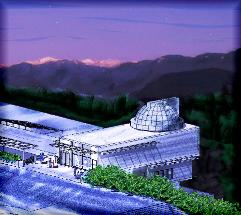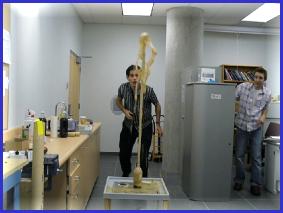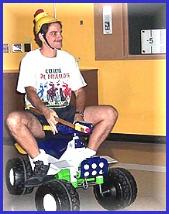What's So Great About Teaching?
Just about everything!
When I first came to SFU as an Assistant Professor in 1993, I was not looking forward to teaching. I thought it would be really hard work, and a distraction from what I really wanted to do, which was research. Little did I know how much inspiration, fun, and learning I would find in teaching, and how quickly and how deeply this would become part of my purpose (the part about hard work was the only preconception I had about teaching that was right, but nothing worth doing is easy!). My most meaningful professional achievements are the SFU University and Faculty of Science Excellence in Teaching Awards, which I received in 1995, and my most enduring and enriching experiences at SFU have come from interacting with students at all levels of the educational experience, and with other educators, and the new understanding that I have drawn from them.
Use the buttons on the right to choose among several panels with some resources from the courses that I have taught. I have taught at every level of the undergraduate and graduate physics programs at SFU, from a high school level makeup class, through advanced graduate classes.
 I am also heavily involved in public outreach activities, including acting as the host of Starry Nights @ SFU, a series of pubic "star parties" held from time-to-time on the Burnaby campus. These events are free and open to everyone, whether from SFU or the greater community. For instance, during the 2009 International Year of Astronomy (IYA), we hosted over 3,500 members of the public at a variety of astronomy events. I am also spearheading development of an SFU Astronomical Teaching Obseravatory and Science Outreach Centre, illustrated in the concept drawing to the right.
I am also heavily involved in public outreach activities, including acting as the host of Starry Nights @ SFU, a series of pubic "star parties" held from time-to-time on the Burnaby campus. These events are free and open to everyone, whether from SFU or the greater community. For instance, during the 2009 International Year of Astronomy (IYA), we hosted over 3,500 members of the public at a variety of astronomy events. I am also spearheading development of an SFU Astronomical Teaching Obseravatory and Science Outreach Centre, illustrated in the concept drawing to the right.
One of the great things about teaching is teaching a new course, because one then has to finally figure out many (most?!) of those many parts that one did not get as a student; maybe it is the pressure to "get it" in time that makes it happen (though there are always more bits that have to wait for the next offering!). I have also discovered how wrong I was about those physics subjects which I disliked as a student (such as when I ended up teaching an extra week of geometric optics in Physics 121, beyond what is called for in the official syllabus, because it turned out to be so excellent - that is definitely not how I remember feeling about the subject as a student!). Over time, I have been systematically seeking out teaching assignments for those courses which as a student I did not like, or in which I had the greatest difficulty (in addition to those subjects which I have always enjoyed, or always wanted to do again in more depth).
The more that I have taught, and the more important that teaching and interacting with students and other educators has become to me, the more difficult I have found it to articulate a philosophy of teaching and learning that goes beyond a simple list of the necessary elements ... getting to the subtler set of sufficient ingredients is far more challenging (and if it wasn't, then great teachers wouldn't be so hard to find!), and these always seem to be just beyond reach. While striving for a more essential philosophy, I invest myself in the process: always showing commitment to each individual; striving to move around the perception of a fundamental difference between teacher and student; avoiding the passion-killer of jadedness over any bit of knowledge; and, above all, stepping outside the comfortable bubble of the classroom professor, to expose my limitations and to visibly take risks in learning (and performing!) in the classroom, for learning often is risk taking, stepping outside one's comfort zone, and always being open to something new.
Another set of questions concerns what makes for good physics pedagogy. Perhaps it is just physicist ego, but physics does seem to be a particularly difficult subject to learn (and teach!). It appears to be a common trap for physicists to teach the subject according to what they experienced as a student (what was hard for me, what was interesting for me, what worked for me, etc.), and I struggle to avoid falling into that pit (but often do). Physicists are also notorious for not adapting to results of the extensive research in physics education, and while I have not changed fast enough, I have used and benefited greatly from the experience and advice of SFU colleagues Neil Alberding and Jeff Rudd, who have aggressively incorporated new methodologies (and with honourable mention to Mehrdad Rastan for his insight into what works "on the ground"). I have also recently been trying to incorporate some elements of the the Peer Based Instruction method of Eric Mazur, especially in my Introduction to Astronomy class: this is one area where I intend to invest much more effort in the future.
I have invested a great deal of energy in developing what I hope are some useful and novel pedagogical tools. I have had an especially good time (and spent countless hours!) developing material and points of view for understanding Einstein's Special Theory of Relativity (SR). In addition to teaching several undergraduate classes with an SR component, I have developed an extensive set of animated storyboards that try to present the essential aspects of Special Relavity, in a purely visual form, without arithmetic. This is such a kinetic subject, one which seems particularly suited to the use of "dynamic" storyboards in coming to grips with its many paradoxes. You can see my storyboards and more links and information by clicking the Relativity button on the right.
I have also extensively redesigned the survey course Introduction to Astronomy (Physics 190) to target non-science students, including the development of an extensive experiential activity guide. Non-science students at SFU now have to fulfill science and quantitative analysis requirements, and Physics 190 is now oriented specifically to them. One of my principal goals in this redesign has been to provide non-science students with the opportunity to experience a sense of what it is like to actually "do" science, at least in a simplified model. To that end, I designed an experiential component for course, for which I wrote an activity guide that is distrbuted to students at cost. A typical semester-long activity sequence consists of four-to-six freshman-level physics labs, and four-to-six naked-eye astronomy observation projects. The astronomy projects portion of the activity guide is updated every semester to reflect what is currently "up" in the night sky. More information on the course, including a PDF copy of the activity guide from a recent offering of the course, is available by clicking the AstroGuide button on the right. I also gave a talk on the novel aspects of this course at the 2007 SFU Symposium on Innovative Teaching: the slideshow for this presentation is posted on my Talks page (click the "Outreach" button there).

